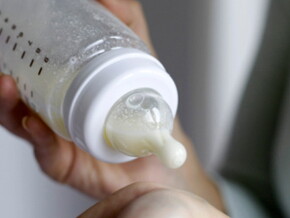
Food allergy is more often found in children than in adults. In one report in North America, approximately 5% of children under the age of five were noted to have a food allergy.
For many years, healthcare professionals recommended that some of the most common allergens in food (including eggs, milk, mustard, peanuts, shellfish and fish, sesame seeds, soy, wheat, and tree nuts) should not be included in the diets of babies until at least one year of age. For certain foods, the advice was to wait until the age of two or three. However, this dated practice of delaying the introduction of foods known to cause allergies may actually have contributed to the rise in cases of reported food allergies.
New thinking
In recent years, recommendations have changed and scientists have discovered that, when your baby is developmentally ready, there is no need to wait before giving these common allergens to your healthy baby, once they have started complementary feeding. Studies have found that delaying offering babies allergens, beyond six to 10 months of age, may increase the risk of food allergy. It has been suggested that introducing these foods early, and eating them regularly in small amounts, may help your baby’s immune system better tolerate some of these foods, and help prevent allergic reactions.
New guidelines recommend giving peanuts (in age-appropriate texture) and foods containing gluten to healthy babies around the time you start complementary feeding. Whole peanuts should not be given to babies or children younger than four years because of the risk of choking. Gluten is found in foods made from wheat, rye, and barley—for example, breads, pasta, cereals, and crackers.
If your baby has eczema, a family history of allergy, or any current food allergy, be sure to speak with your healthcare provider before introducing potential allergy-triggering foods.
Wait and watch
Offer your little one their first taste of these foods individually, then wait a couple of days before trying another, so that you’ll be able to identify if a certain food causes a reaction. Whole cow’s milk is not recommended before 9-12 months of age, once your baby is eating a variety of iron-rich foods. Other dairy products, such as plain yogurt, can be offered after six months of age.
It is also believed that breastfeeding may offer some protection against allergies, so continue to breastfeed your baby for as long as you can, especially if there is a family history of allergies.
Sources
https://www.cdc.gov/nchs/data/databriefs/db10.htm (Accessed December 18, 2017)
Du Toit G, Sayre PH, Roberts G et al. Effect of avoidance on peanut allergy after early peanut introduction. N Engl J Med 2016; 374(15):1435-43.
Du Toit G, Roberts G, Sayre PH et al. Randomized trial of peanut consumption in infants at risk for peanut allergy. N Engl J Med 2015; 372(9):803-13.
Fewtrell M, Bronsky J, Campoy C et al. Complementary feeding: A position paper by the European society for paediatric gastroenterology, hepatology and nutrition (ESPGHAN) committee on nutrition. J Pediatr Gastroenterol Nutr 2017; 64(1): 119-32.
Ierodiakonou D, Garcia-Larsen V, Logan A et al. Timing of allergenic food introduction to the infant diet and risk of allergic or autoimmune disease. A systematic review and meta-analysis. JAMA. 2016; 316(11):1181-92. doi:10.1001/jama.2016.12623.
Togias A, Cooper SF, Acebal ML et al. Addendum guidelines for the prevention of peanut allergy in the United States: Report of the national institute of allergy and infectious diseases-sponsored expert panel. J Allergy Clin Immunol 2017; 139(1):29-44.





















